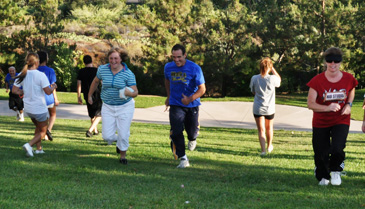EXERCISE FOR ENERGY
By Tom Wilson
 How many times have you been lying on the couch thinking I should get some exercise but I just don’t have the energy? One of the biggest complaints I hear, day in and day out, is “I just feel tired all the time.”
How many times have you been lying on the couch thinking I should get some exercise but I just don’t have the energy? One of the biggest complaints I hear, day in and day out, is “I just feel tired all the time.”
There are many factors that affect our energy levels such as sleep, diet, stress, hydration levels, illness and yes, exercise. A lot of times when people are fatigued, the last thing they want to do is exercise. But in reality, a brisk walk will do way more than a nap for boosting energy. Hundreds of studies have proven that those who exercise on a regular basis have more energy than sedentary individuals. This research has shown that nearly every group studied, from healthy adults to cancer patients to those with chronic conditions including diabetes and heart disease benefited from exercise.
The problem is we live in a society where people are always looking for short-cuts. They’d rather guzzle down the latest sports drink, energy bar or super caffeinated coffee drink in search of that feel good energy that comes naturally from exercise. The bottom line is, God created our bodies to be active and the right activity provides the energy we need to get through each day.
EXPEND ENERGY TO GET ENERGY
Pastor Rick told us, if we want more of something we need to give it away. If we want more money, give it away. If we want more love, give love. The same holds true with energy. To get energy you need to expend energy. It may seem counter-intuitive, but exercising doesn’t make you tired, it literally creates energy in your body. It’s the way God designed our bodies to function. He wants us to be active because He wants us to be healthy. Located in our cells are tiny organs called mitochondria which act like tiny power plants to produce energy. The more you exercise aerobically, the more mitochondria the body makes, providing you with more energy throughout your day.
“BUT EXERCISE MAKES ME TIRED”
Of course, you will experience fatigue at some point during your workout. This is perfectly normal. But if you’re exercising correctly, this feeling of fatigue will subside within an hour or so post-workout. The increased level of energy that follows this recovery time is what we are talking about when we say that exercising gives you more energy. If you’re just starting to workout, you may feel more tired because your body is adjusting to a new routine. But as your body adjusts, the fatigue will be replaced with energy and the more consistent your workouts the more consistent your energy levels will become.
SOW THE INTENSITY, REAP THE REWARDS
Realize that the intensity of your workout, and the rest you allow between workouts, can affect the energy you get in return. Research has shown an increase in the number and size of the mitochondrial mass (energy power plants) when exercise is performed at around 70-80% of maximum heart rate and sustained for at least 20 minutes. If you’re just starting out, you may need to keep your intensity levels much lower. Using walking as an example, if you go for a leisurely walk without raising your heart-rate, your energy returns will be minimal. As the saying goes, you get out of it what you put into it. This is why all too often people give up on exercise. They don’t reap the rewards because they don’t sow the necessary intensity!
The recovery phase is equally important as it enables the mitochondria to increase in both size and numbers. The more you exercise, the more you need to pay attention to how much sleep and rest your body gets in between workouts. The Daniel Plan nutritional recommendations also play a huge role in energy levels and recovery. I always tell the athletes I work with that you will never out-train a bad diet!
So the next time you’re feeling lethargic and just don’t feel the energy to exercise, get up and walk around the room for a couple minutes. This may be just enough to power up those mitochondria energy factories and launch you off to a great energy producing round of exercise!